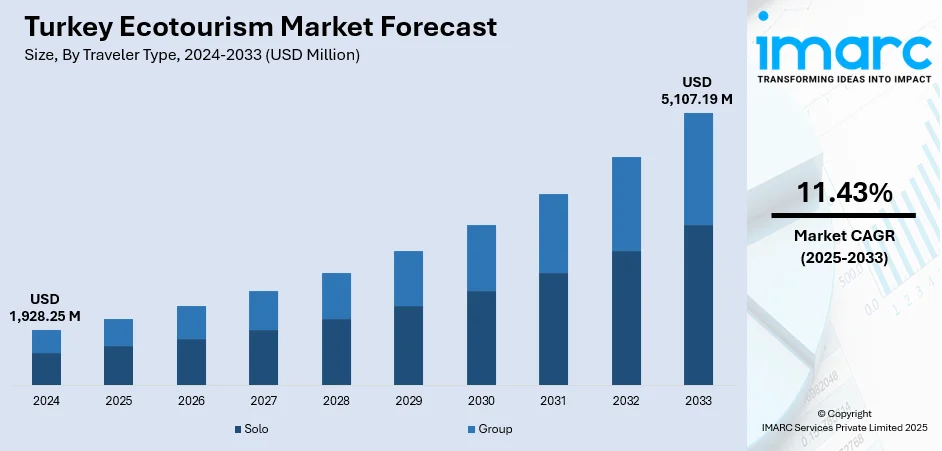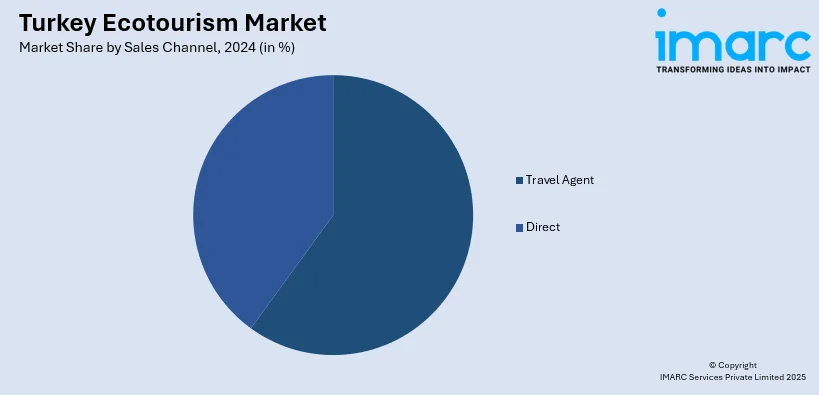
Turkey Ecotourism Market Size, Share, Trends and Forecast by Traveler Type, Age Group, Sales Channel, and Region, 2025-2033
Turkey Ecotourism Market Overview:
The Turkey ecotourism market size reached USD 1,928.25 Million in 2024. The market is projected to reach USD 5,107.19 Million by 2033, exhibiting a growth rate (CAGR) of 11.43% during 2025-2033. The market is fueled by rich natural scenic landscapes, diverse ecosystems, and country culture, which form a strong platform for market growth. In addition, rising environmental awareness among local as well as global tourists, coupled with the growing need for a sustainable tourism experience, is also accelerating market expansion. Besides this, government initiatives towards the development of eco-friendly infrastructure, along with promotional schemes, are also augmenting the Turkey ecotourism market share.
|
Report Attribute
|
Key Statistics
|
|---|---|
|
Base Year
|
2024 |
|
Forecast Years
|
2025-2033
|
|
Historical Years
|
2019-2024
|
| Market Size in 2024 | USD 1,928.25 Million |
| Market Forecast in 2033 | USD 5,107.19 Million |
| Market Growth Rate 2025-2033 | 11.43% |
Turkey Ecotourism Market Trends:
Integration of Community-Based Tourism Models
A key trend shaping the market is the increasing adoption of community-based tourism (CBT) models that emphasize local empowerment and socio-economic inclusivity. This approach actively involves rural and indigenous communities in the planning, management, and delivery of tourism services, allowing them to directly benefit from the sector's growth. These initiatives are further supported by government bodies and non-governmental organizations through training programs, infrastructure investments, and capacity-building efforts designed to enhance tourism offerings without harming the ecological balance. Notably, on August 15, 2024, Türkiye unveiled a strategic expansion of its ecotourism network by adding 26 new ecotourism areas, increasing the total to 99 zones, surpassing the planned target for 2024. These additions span 54 provinces, from Adana and Ankara to Erzurum and Zonguldak, reflecting a nationwide push to diversify nature-based tourism. This expansion aligns with the broader 2021–2025 Ecotourism Action Plan, targeting 110 routes by 2025 and aiming to reach 200 areas by 2028. Moreover, modern travelers increasingly desire genuine, immersive experiences that allow them to engage with local customs, cultural traditions, and artisanal legacies. As sustainability becomes central to travel preferences, CBT reinforces the nation's leadership in responsible tourism while advancing rural development and community resilience.

To get more information on this market, Request Sample
Expansion of Protected Natural Areas and Eco-Reserves
Turkey is witnessing a strategic expansion of its protected natural areas and eco-reserves, reflecting a broader national commitment to biodiversity conservation and sustainable tourism. This trend is significantly propelling the Turkey ecotourism market growth. Furthermore, the country is home to a wide array of unique ecosystems, including coastal wetlands, alpine forests, and mountainous terrains, many of which are now being integrated into ecotourism circuits. Notable examples include the Kaçkar Mountains National Park, Lake Bafa Nature Park, and the wetlands of Göksu Delta, which are drawing eco-conscious travelers interested in hiking, birdwatching, and nature photography. This trend is also fueled by partnerships between the Ministry of Environment, international conservation organizations, and local stakeholders to ensure that tourism development aligns with ecological preservation goals. Also, infrastructure enhancements such as marked trails, eco-lodges, and information centers are implemented with minimal environmental impact. For instance, on August 15, 2024, TUI announced the commissioning of three new solar power plants in Turkey, with a combined capacity of 15 MW, to supply clean energy to eight of its hotels year-round. The initiative aligns with TUI’s broader sustainability strategy to achieve carbon-neutral operations across its hotels and resorts, with further solar projects, including one in Sanliurfa, currently under development. Besides, strict visitor management policies, environmental education programs, and local guide certifications are enhancing visitor experiences while safeguarding fragile ecosystems. This expansion is reshaping Turkey’s tourism landscape into one rooted in long-term environmental stewardship.
Turkey Ecotourism Market Segmentation:
IMARC Group provides an analysis of the key trends in each segment of the market, along with forecasts at the country and regional levels for 2025-2033. Our report has categorized the market based on traveler type, age group, and sales channel.
Traveler Type Insights:
- Solo
- Group
The report has provided a detailed breakup and analysis of the market based on the traveler type. This includes solo and group.
Age Group Insights:
- Generation X
- Generation Y
- Generation Z
A detailed breakup and analysis of the market based on the age group have also been provided in the report. This includes generation X, generation Y, and generation Z.
Sales Channel Insights:

- Travel Agent
- Direct
The report has provided a detailed breakup and analysis of the market based on the sales channel. This includes travel agent and direct.
Regional Insights:
- Marmara
- Central Anatolia
- Mediterranean
- Aegean
- Southeastern Anatolia
- Blacksea
- Eastern Anatolia
The report has also provided a comprehensive analysis of all the major regional markets, which include Marmara, Central Anatolia, Mediterranean, Aegean, Southeastern Anatolia, Blacksea, and Eastern Anatolia.
Competitive Landscape:
The market research report has also provided a comprehensive analysis of the competitive landscape. Competitive analysis such as market structure, key player positioning, top winning strategies, competitive dashboard, and company evaluation quadrant has been covered in the report. Also, detailed profiles of all major companies have been provided.
Turkey Ecotourism Market Report Coverage:
| Report Features | Details |
|---|---|
| Base Year of the Analysis | 2024 |
| Historical Period | 2019-2024 |
| Forecast Period | 2025-2033 |
| Units | Million USD |
| Scope of the Report |
Exploration of Historical Trends and Market Outlook, Industry Catalysts and Challenges, Segment-Wise Historical and Future Market Assessment:
|
| Traveler Types Covered | Solo, Group |
| Age Groups Covered | Generation X, Generation Y, Generation Z |
| Sales Channels Covered | Travel Agent, Direct |
| Regions Covered | Marmara, Central Anatolia, Mediterranean, Aegean, Southeastern Anatolia, Blacksea, Eastern Anatolia |
| Customization Scope | 10% Free Customization |
| Post-Sale Analyst Support | 10-12 Weeks |
| Delivery Format | PDF and Excel through Email (We can also provide the editable version of the report in PPT/Word format on special request) |
Key Questions Answered in This Report:
- How has the Turkey ecotourism market performed so far and how will it perform in the coming years?
- What is the breakup of the Turkey ecotourism market on the basis of traveler type?
- What is the breakup of the Turkey ecotourism market on the basis of age group?
- What is the breakup of the Turkey ecotourism market on the basis of sales channel?
- What is the breakup of the Turkey ecotourism market on the basis of region?
- What are the various stages in the value chain of the Turkey ecotourism market?
- What are the key driving factors and challenges in the Turkey ecotourism market?
- What is the structure of the Turkey ecotourism market and who are the key players?
- What is the degree of competition in the Turkey ecotourism market?
Key Benefits for Stakeholders:
- IMARC’s industry report offers a comprehensive quantitative analysis of various market segments, historical and current market trends, market forecasts, and dynamics of the Turkey ecotourism market from 2019-2033.
- The research report provides the latest information on the market drivers, challenges, and opportunities in the Turkey ecotourism market.
- Porter's five forces analysis assist stakeholders in assessing the impact of new entrants, competitive rivalry, supplier power, buyer power, and the threat of substitution. It helps stakeholders to analyze the level of competition within the Turkey ecotourism industry and its attractiveness.
- Competitive landscape allows stakeholders to understand their competitive environment and provides an insight into the current positions of key players in the market.
Need more help?
- Speak to our experienced analysts for insights on the current market scenarios.
- Include additional segments and countries to customize the report as per your requirement.
- Gain an unparalleled competitive advantage in your domain by understanding how to utilize the report and positively impacting your operations and revenue.
- For further assistance, please connect with our analysts.
 Request Customization
Request Customization
 Speak to an Analyst
Speak to an Analyst
 Request Brochure
Request Brochure
 Inquire Before Buying
Inquire Before Buying




.webp)




.webp)












